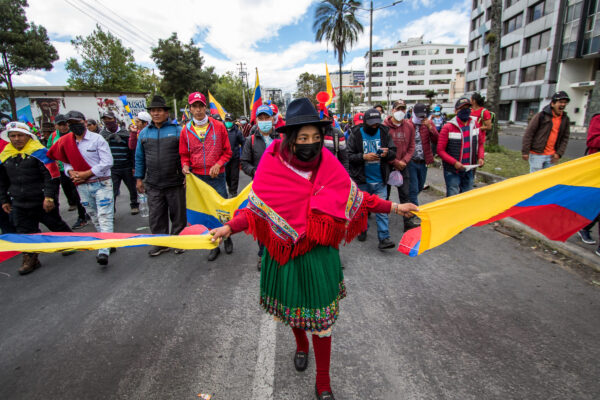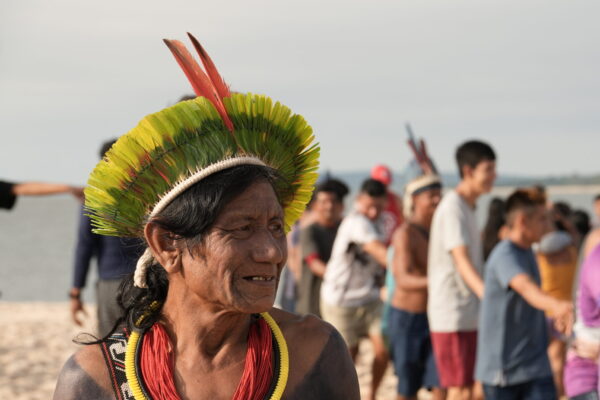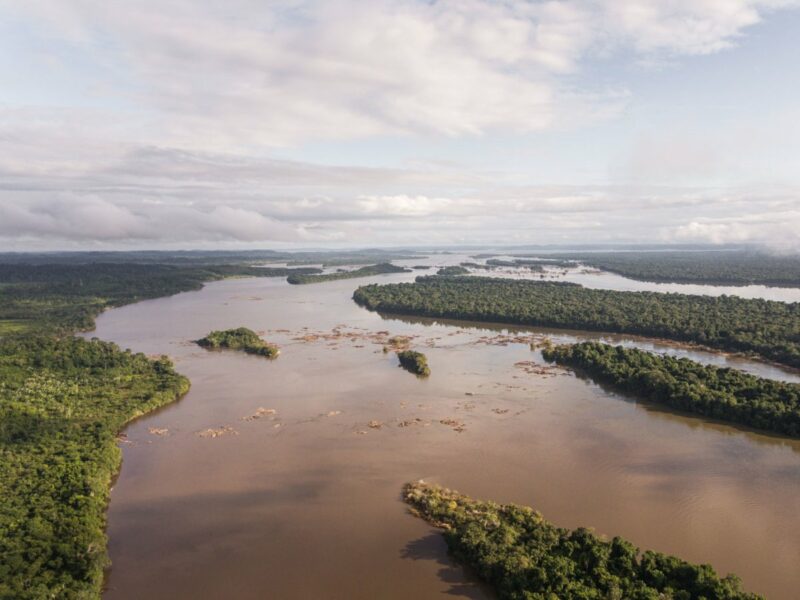Oakland, CA – Representing a coalition of over 50 organizations, Cris Julião Pankararu, Indigenous representative of the Association of Indigenous Peoples of Brazil (APIB), and Gisela Hurtado Barboza, Advocacy Manager at Amazon Watch, will return to Geneva to resubmit allegations of human rights and environmental violations by Canadian extractive firms ahead of Canada’s Universal Periodic Review (UPR) at the United Nations Human Rights Council on November 10, 2023. This delegation signifies the return of civil society representatives and Indigenous leaders to unveil Canada’s actions while demanding transparency, accountability, and the safeguarding of traditional territories and the environment.
The coalition of organizations urges assessing states to recommend that Canada:
- Establish a comprehensive law on due diligence, corporate legal responsibility, and access to justice that regulates Canadian companies and financial institutions;
- Ensure access to justice, reparation, and non-repetition of human rights and environmental violations for those impacted by Canadian business activities abroad; and
- Refrain from implementing, participating in, or financing projects when Indigenous Peoples and local communities living in areas under the direct or indirect influence of the project have not given their Free, Prior, and Informed Consent, in accordance with international standards.
Civil society organizations also urge Canada to enact regulations ensuring gold’s origin traceability, especially when mining occurs in Amazonian countries. They call for a comprehensive energy transition plan that respects human rights and promotes the gradual abandonment of extractive industries that jeopardize the Amazon’s ecological balance.
“The involvement of Canadian companies in human rights violations in Brazil, particularly in cases like the Belo Sun mining project in Pará, starkly contradicts Canada’s self-portrayal as a defender of human rights and environmental stewardship. These violations are not isolated incidents but represent a pattern that impacts not only Indigenous communities but all of humanity. This, further underscored by Canada’s non-ratification of the ILO’s Convention 169, necessitates urgent international action to prompt Canada to regulate its corporate operations,” states Cristiane Pankararu, Indigenous representative of the Association of Indigenous Peoples of Brazil (APIB).
Amazon Watch Advocacy Manager, Gisela Hurtado-Barboza, who is now in Geneva to follow Canada’s UPR session, states: “The Canadian government is complicit in the acts of its companies that violate human rights in Latin America and destroy biodiversity and nature. Canada is very well known to exercise an “economic diplomacy” which focuses on favoring its companies abroad without considering the adverse effects caused by these investments in host countries, nor the associated violence. That is the reason we urge assessing states, in the framework of the Canada UPR session, to recommend Canada to regulate the operations of its companies and financial institutions abroad.”
“We need to hold Canada accountable for the corporate abuses that its companies have committed in Latin America and, above all, in the Amazon rainforest. When it comes to mining, the truth is that Canada is exporting to other countries a pattern of human rights violations and environmental destruction that has been going on for decades in their own territory. The protection of the world’s most biodiverse forest and the rights of the people who keep it standing must prevail over the economic and financial interests of any company or country,” added Gabriela Sarmet, Brazil Campaign Advisor for Amazon Watch.
Background
Indigenous lawyers and activists, representatives of riverine communities, and civil society take part in a pre-conference in Canada
During the Universal Periodic Review, UN member states will assess Canada’s commitment to human rights both domestically and abroad, aiming to prevent abuses and violations. Recommendations are expected to be based on government documents, civil society reports, and UN agency findings on human rights.
To expose Canada’s extractive industry practices, Amazon Watch collaborated with more than 50 civil society organizations to produce three documents for Canada’s UPR process at the UN: the Regional, Amazon, and Oil reports. These documents highlight irregularities and violations in 37 projects carried out by 34 Canadian companies in nine Latin American and Caribbean countries. Notably, 27 of these projects involve mining, with 21 focused on gold mining.
Among the four Canadian projects in the Brazilian Amazon, three are gold mining operations, including the controversial Belo Sun Mining Corp, which was included in the Brazilian government’s Growth Acceleration Program despite threats to the Xingu River and the Volta Grande region’s ecological balance.
Likewise, the Warintza project in Ecuador, operated by Solaris Resources Inc., and the Mocoa project, run by Libero Copper in Colombia, has violated the Shuar Arutam and Inga Indigenous peoples’ right to territory, self-determination, and Free, Prior, and Informed Consent, and has used divisive strategies, also ignoring their organizational structures.
It is disturbing that 32 of the 37 Canadian projects violate the right to a clean, healthy, and sustainable environment. Among these, 12 projects affect the land, 29 impact water resources, and one affects air quality. An example is Block 192 in Peru, operated by Frontera Energy, which has caused approximately 105 oil spills, contaminating rivers, lakes, and groundwater, resulting in a serious impact on the air quality of 26 Indigenous communities.
To disseminate the report’s findings, a delegation composed of Indigenous leaders, local communities, and Latin American civil society representatives convened in Geneva for the UPR pre-session held between August and September 2023. In addition to meetings with country permanent missions and advocacy efforts, the report “Unmasking Canada: Rights Violations Across Latin America” was launched at that time. These allied organizations remain united in their call for Canada’s accountability regarding Canadian companies’ misconduct.













